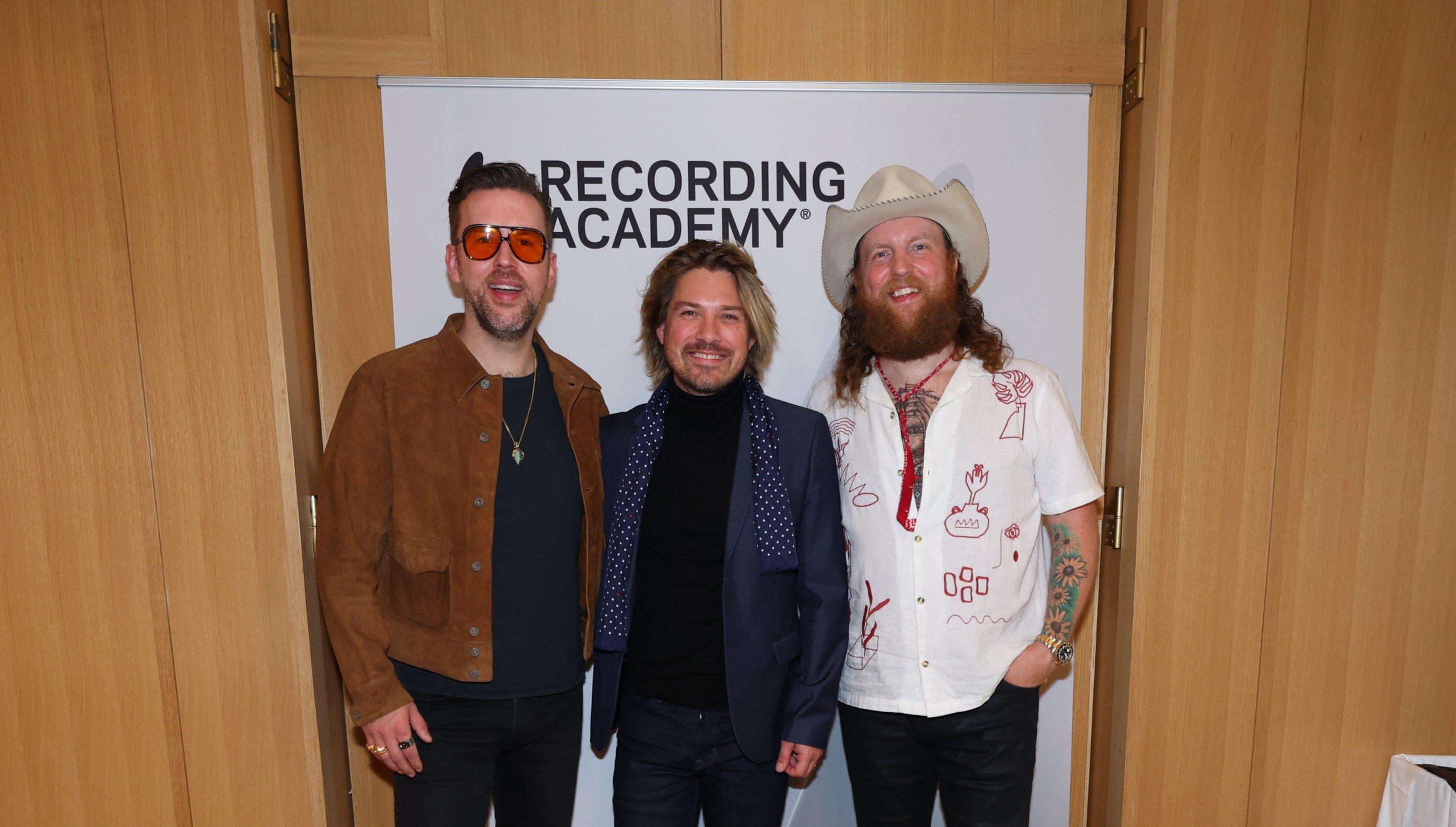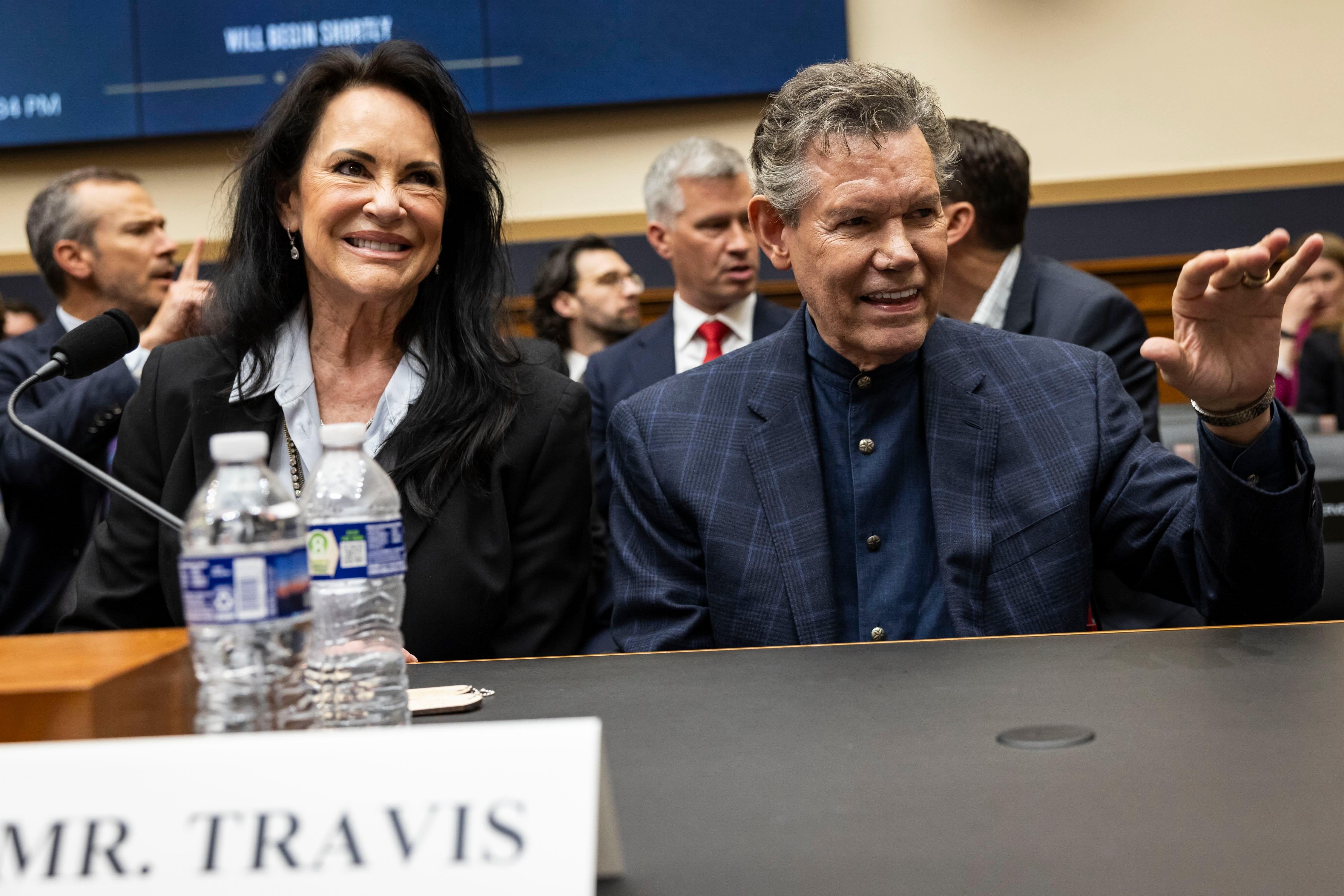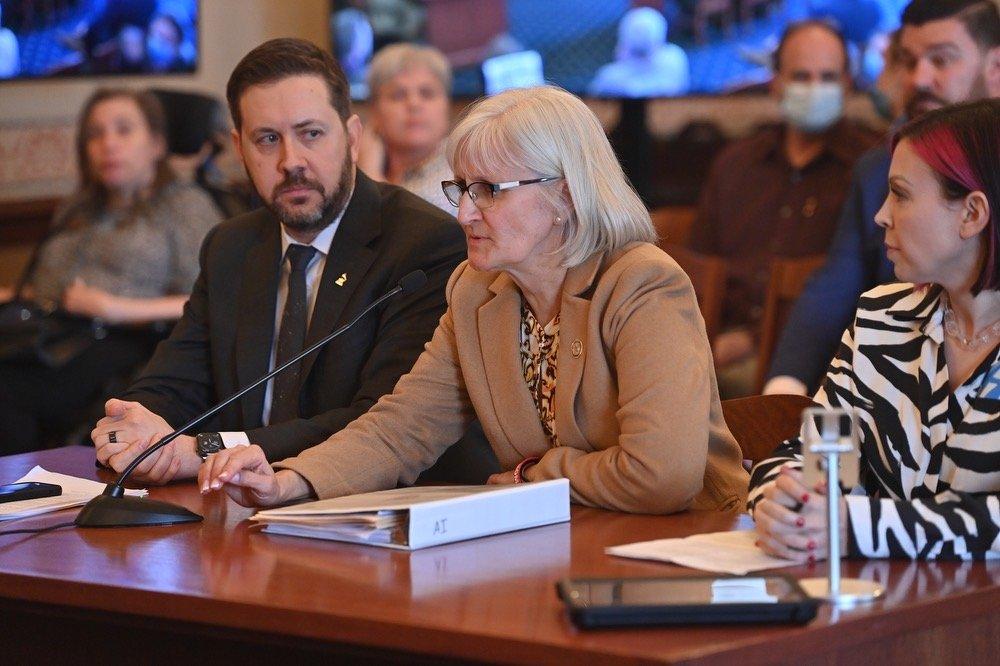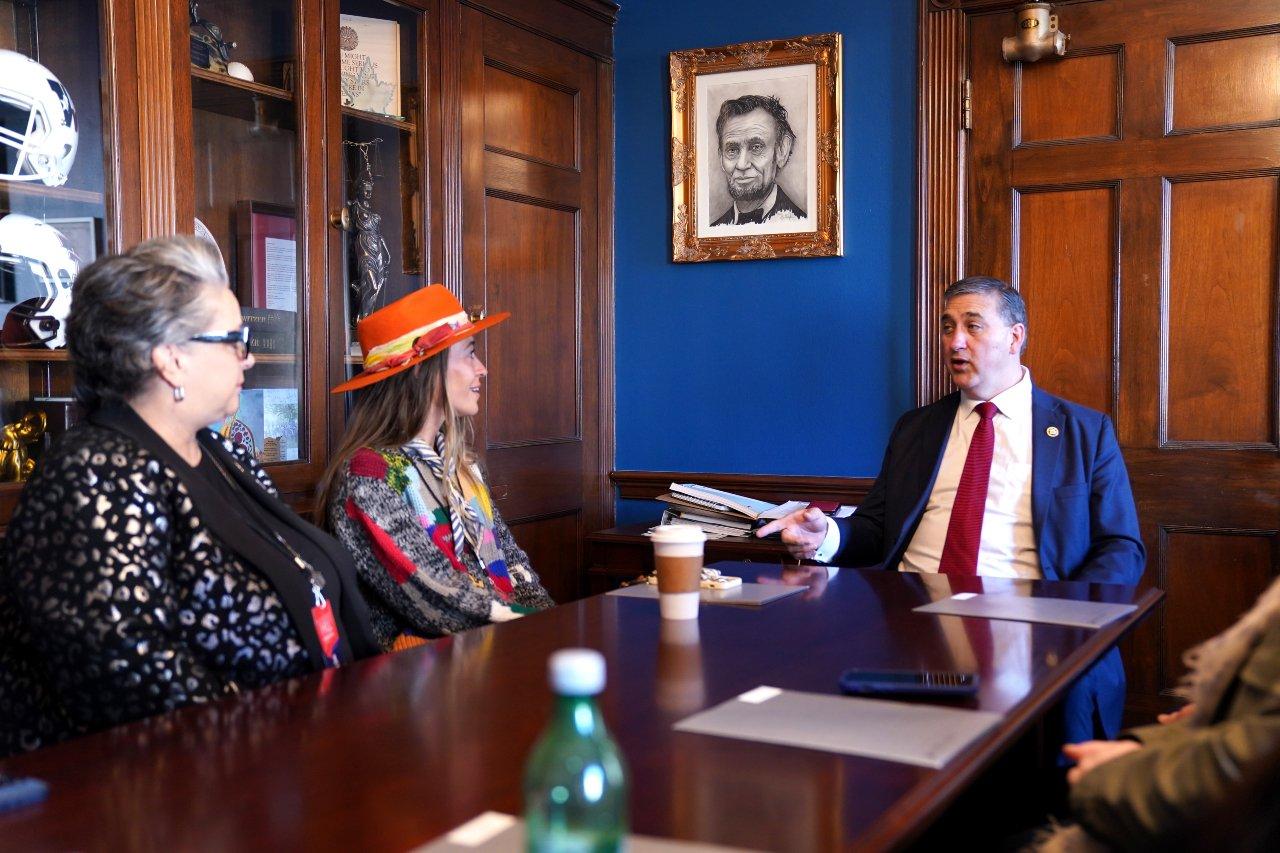Photo courtesy of the Recording Academy

list
How Newly Elected Recording Academy Trustees Are Involved In Advocacy: Dani Deahl, Taylor Hanson & More
Newly elected Recording Academy Trustees Dani Deahl, Taylor Hanson, Torae Carr, and Sara Gazerak have a history of advocacy for music people. Get to know them below.
The Recording Academy's Board of Trustees has a history of being filled with members that are both passionate about making music and advocating for music creators. The newly elected slate of trustees is no exception and four of the new members continuously show their dedication to advocacy.
Those Trustees are Dani Deahl, Taylor Hanson, Torae Carr, and Sara Gazerak. They're four of a total of 19 leaders of diverse backgrounds and disciplines who have assumed their position on the 2024-2025 Board of Trustees.
Effective June 1, the newly elected Trustees joined the Academy's midterm Trustees, including National Officers Tammy Hurt (Chair), Dr. Chelsey Green (Vice Chair), Gebre Waddell (Secretary/Treasurer), and Christine Albert (Chair Emeritus).
Their mission is to uphold the Academy's core values: to serve and represent the music community at-large through its commitment to promote diversity, equity and inclusion, fight for creators' rights, protect music people in need, preserve music's history, and invest in its future.
About that fight for creator's rights, specifically: read on for these four Trustees' advocacy bona fides.
Dani Deahl
This prominent artist, DJ and producer previously served as the Recording Academy's Chicago Chapter Governor. She's also been a prolific advocate for music makers and the greater music industry.
In March, Deahl testified in front of the Illinois House and Senate on HB 4875/SB 3325 alongside fellow Chicago Chapter member Jeff Becker. HB 4875/SB 3325 represents a crucial step towards modernizing Illinois's Right of Publicity Act for the AI era.
By granting additional enforcement rights and remedies, the bill was created to shield musicians from exploitation by generative AI systems. While existing copyright laws offer some protection, the amendments directly address gaps in safeguarding an artist's name, image, likeness, and voice.
Shortly after the Academy and Deahl's advocacy efforts in Springfield, HB 4875/SB 3325 passed through both the Illinois House and Senate and is with Governor J.B. Pritzker waiting to be signed into law.
On Friday, May 3, Deahl participated in the Recording Academy's Inaugural GRAMMYs on the Hill Future Forum. Designed to provide a space to explore the most pressing issues facing music, this momentous occasion served as a pivotal platform to delve into the impact of artificial intelligence (AI) on the music community. The afternoon consisted of a series of panel discussions curated to explore both the promise and the peril that AI presents to music makers.
Deahl joined GRAMMY nominated producer, emcee, vocalist, and thought leader, Kokayi, and Recording Academy's Chief Advocacy & Public Policy Officer, Todd Dupler, for the first panel of the afternoon.
Throughout the discussion, Deahl demonstrated live how she ethically uses AI as a tool to enhance her music, including stem separation, voice or tone replacement, and song generation. Dani also attended and participated in the 2024 GRAMMYs on the Hill Awards and Advocacy Day.
Taylor Hanson
You know that surname: he's a former Texas Chapter President, three-time GRAMMY nominated artist and member of the band Hanson.
Last August, Recording Academy members of the Texas Chapter, including Taylor Hanson, headed to Oklahoma City to meet with state government officials to build up the relationship between the Oklahoma music community and state leaders.
Throughout the day, the group met with Lieutenant Governor Matt Pinnell and the Deputy Director of the Oklahoma Film and Music Office, Jeanette Stanton, at the state's Capitol before heading to the Governor's Mansion.
During the meeting, they discussed the importance of the music community in Oklahoma, ways the state can continue to be involved in supporting the music community, and how the Recording Academy can be a resource for ensuring artists' voices are heard.
At the Governor's Mansion, Hanson participated in a panel with other Texas Chapter members on the Recording Academy and how Oklahoma Academy members and music creators can get involved. Specifically, the group highlighted the Recording Academy's District Advocate Day, which Hanson has been a vocal supporter of.
Taylor Hanson has participated in numerous District Advocate meetings, attended the 2024 GRAMMY Advocacy Brunch, and has also used his social platform to spread awareness about the Recording Academy's grassroots advocacy movements.
Torae Carr
On May 7, 2024, this rapper and former New York Chapter President joined other members of the Recording Academy's New York chapter and took to the state capitol in Albany. The purpose was to advocate for the passage of A 127, a crucial piece of legislation designed to safeguard the creative works of artists across New York.
Throughout the day, the group met with key members of the Assembly to express their support for the bill and highlight the crucial need to protect artistic freedom during legal proceedings.
At the time of the advocacy day, A 127 had already passed through the senate. Since then, it has been voted through the Assembly Codes Committee with the goal to be voted on in the Assembly in the coming days.
Sara Gazerack
Gazerack isn't just a GRAMMY-winning jazz vocalist: she serves as one of the Los Angeles Chapter's Advocacy Representatives and most recently was a Los Angeles Chapter Governor.
This spring, Sarah joined some 60 GRAMMY winners, nominees, and Recording Academy executives in DC for GRAMMYs on the Hill. Sara met with Rep. Jerry Nadler (D-NY), Rep. Larry Bucshon (R-IN), and policy staff of Rep. Katherine Clark (D-MA).
The Advocacy Day consisted of meetings with Senators and Representatives on Capitol Hill and a visit to the White House for a roundtable discussion on AI policy, ticket reforms, the National Endowment for the Arts, and the president's work on gun violence, before a special conversation with Press Secretary Karine Jean-Pierre.
The Recording Academy commends these Trustees for their commitment to advocacy for music people — and to follow their future work in this regard, keep checking RecordingAcademy.com/Advocacy for up-to-date info!
Illinois Passes AI Digital Replica Protections Law: What To Know About HB 4875

Photo: Samuel Corum/Getty Images
news
Watch: House Judiciary Subcommittee Holds "Radio, Music And Copyrights: 100 Years Of Inequity For Recording Artists" Hearing
The hearing examined why artists and producers don't receive royalty payments for the public performance of their songs by broadcast radio stations and efforts to modernize copyright law.
On Wednesday, June 26, the House Judiciary Subcommittee on Courts, Intellectual Property, and the Internet held a hearing titled "Radio, Music, and Copyrights: 100 Years of Inequity for Recording Artists." The aim of this hearing was to examine an injustice affecting the music community: creators not receiving royalty payments for public broadcasting of their sound recordings on terrestrial radio.
The hearing explored the legislative proposal, the American Music Fairness Act of 2023, which would require a license for broadcasting sound recording via AM/FM radio, and ensure that music creators receive compensation for their work no matter the platform. You can watch the deliberations below:
The hearing witnesses included country legend Randy Travis, who boasts seven GRAMMYs and 16 nominations; Curtis LeGeyt, the President and Chief Executive Officer of the National Association of Broadcasters; Michael Huppe, the President and Chief Executive Officer of SoundExchange; and Eddie Harrell Jr., the Regional Vice President and General Manager of Radio One, Inc., in Cleveland.
As Travis had a stroke 10 years ago that limits his ability to speak, his wife, Mary Travis, testified on his behalf. Her testimony wrapped with, "We ask your help in righting the wrong… ensure that artists are paid for their work, their identity is theirs alone, and the soundtracks of our lives continue to play on… Forever and Ever, Amen!" evoking one of her husband's most iconic tracks.
The Recording Academy is a long-term proponent of the American Music Fairness Act. Sponsored by Rep. Darrell Issa (R-CA) and Rep. Jerry Nadler (D-NY), the AMFA is a balanced solution that ensures music creators are fairly compensated when their songs are played on AM/FM radio, but with carefully crafted exemptions to protect small and local broadcasters.
During the hearing, several members of the subcommittee expressed strong support for the American Music Fairness Act, and many encouraged the radio industry to work with artists and record labels on reaching a solution to end the century-long injustice.
The bill recognizes the property rights of creators, while supporting community broadcasters across the United States. For close to a century, performers, musicians, and studio professionals have been denied the basic right to receive compensation for their work when their music is played by AM/FM radio.
From the foundational performers of the past to today's iconic stars and the thousands of indispensable backing vocalists, instrumentalists, producers, engineers, and mixers, precisely zero dollars have gone to the creators behind the music played on the radio.
To make matters worse, the United States is one of the only countries in the world– a distinction it shares with countries like Cuba, North Korea,and Iran– where this inequity exists, costing artists hundreds of millions of dollars in lost reciprocal royalties overseas in addition to the royalties that aren't paid at home.
The Recording Academy has been championing this issue for almost two decades — and they're far from alone. In December of 2022, during the 117th Congress, identical legislation passed out of the House Judiciary without any recorded opposition — just another reason why the Recording Academy has faith that the AMFA has legs.
Click here for ways to support the American Music Fairness Act and get involved in the advocacy for music creators, and stay tuned for more information about the Academy's continued fight for all music people.

Photo courtesy of the Illinois Senate Democratic Caucus
news
Illinois Passes AI Digital Replica Protections Law: What To Know About HB 4875
On Friday, May 24, the Illinois House of Representatives unanimously passed HB 4875, sending the bill to the Governor's desk to become law. Here's what that means for artistic protections for artists and individuals.
The Illinois General Assembly is fighting the good fight to protect artists and individuals from unauthorized AI digital replicas.
On Friday, May 24, the Illinois House of Representatives unanimously passed HB 4875, sending the bill to the Governor's desk to become law. HB 4875, which unanimously cleared the state senate earlier in May, modernizes Illinois's existing Right of Publicity law to specifically address the challenges artists face from AI-generated creations and digital replicas.
Since the legislation's introduction by Rep. Jennifer Gong-Gershowitz and Senator Mary Edly-Allen the Recording Academy has been an advocate for the bill and how it establishes key safeguards and enforcement mechanisms to ensure an individual's identity is not misappropriated by generative AI.
In April, members from the Recording Academy's Chicago Chapter went to the state capitol in Springfield for a state advocacy day in support of the bill. Immediately following that day of action, the bill cleared the House of Representatives for the first time and was sent to the Senate for further action.
And earlier this year, in March, Recording Academy Chicago Chapter Board Members Jeff Becker and Dani Deahl testified in support of the legislation during hearings in the House and Senate. Their testimonies laid the foundation to pass the bill, bringing needed attention and support from state lawmakers.
"As we embrace AI's potential, we must also be prepared for the risks it presents that are already here. The clearest example of these risks is the ability of AI to steal people's images and voices," Deahl testified. "I myself have had the unsettling experience of hearing my voice replicated by AI, delivering messages I never endorsed. This violation of identity is a profound invasion of personal autonomy."
Once signed into law by Gov. J.B. Pritzker, Illinois will become the second state in the nation to proactively protect creators from having their likeness replicated without permission by generative AI. In March, Tennessee Gov. Bill Lee signed the ELVIS Act into law to become the first state. The Recording Academy worked closely with the Governor, Tennessee legislators, and other stakeholders in the passage of the groundbreaking law.
The Recording Academy is also prioritizing federal protections to confront this growing threat to human creativity. During this year's GRAMMYs on the Hill, GRAMMY winners and nominees came to Washington, D.C. to urge Members of Congress to support the House's No AI FRAUD Act and the Senate's NO FAKES Act. Both bills would establish similar protections to Illinois's HB 4875.
For more information on how the Recording Academy continues to fight for artists' rights, keep checking our Advocacy page at recordingacademy.com.
The House Of Representatives Has Passed The TICKET Act: Here's What You Need To Know

Photo: Leigh Vogel
news
The House Of Representatives Has Passed The TICKET Act: Here's What You Need To Know
This legislative success for music fans comes just two short weeks after the Recording Academy's GRAMMYs on the Hill Advocacy Day, and passed by an overwhelming bipartisan vote.
In an exciting step forward for the music community, the House of Representatives recently passed H.R. 3950, the Transparency In Charges for Key Events Ticketing (TICKET) Act, by an overwhelming bipartisan vote of 388-24. This legislative success comes just two short weeks after the Recording Academy's GRAMMYs on the Hill Advocacy Day.
During the GRAMMYs on the Hill Advocacy Day, over sixty GRAMMY winners, nominees, and Recording Academy executives met with members of Congress to push for ticketing reform, including the House's TICKET Act and the Senate's Fans First Act. Throughout the day, the artist advocates told lawmakers how the broken ticket marketplace impacts their daily lives. Among the group was 2-time GRAMMY winner, Lauren Daigle, who detailed her experiences with bots and resellers driving up ticket prices, emphasizing the impact it has on the individuals hoping to purchase tickets to her shows. These conversations highlighted the importance of protecting the human connection that live music fosters between artists and fans and the clear need for ticket reforms to be passed by congress.
The House-passed TICKET Act brings transparency to the ticketing marketplace by implementing all-in pricing and takes major steps toward ending the harmful practices of speculative ticketing and deceptive websites. The bill, which also guarantees refunds for event cancellations, denotes serious progress in the fight to improve the ticketing marketplace.
The Recording Academy urges the Senate to seize this moment and pass S. 3457, the Fans First Act. The Fans First Act builds upon the House TICKET Act by strengthening its provisions against speculative ticketing and deceptive websites and improving price transparency by not only requiring all-in pricing, but mandating upfront itemization so fans know what they're paying for from the start. The Fans First Act also increases consumer protection by strengthening the BOTS Act and the FTC's ability to enforce any violations.
Upon its passage, Recording Academy CEO, Harvey Mason Jr. expressed gratitude for the bipartisan support and the swift movement of the TICKET Act through the House.
"Today's passage of the TICKET Act by the House of Representatives marks a significant step forward toward improving the concert ticket marketplace. The TICKET Act was a key focus of GRAMMYs on the Hill two weeks ago, and the Recording Academy thanks our Congressional leaders for bringing the bill to a vote shortly after meeting with Academy members.
We now urge the Senate to act quickly to incorporate the strong provisions contained in the Fans First Act and move a comprehensive ticket reform package that will provide transparency and protect artists and their fans.
The passage of the TICKET Act represents a critical step toward dismantling the predatory practices that undermine this connection. It is a crucial step toward ensuring a more equitable and sustainable marketplace. The legislation not only benefits consumers but also safeguards the livelihoods of artists who depend on fair ticket sales. Its passage proves the power of advocacy and the importance of legislative action in preserving the special bond between artists and their audiences.
As we look forward to the Senate's taking further action on ticketing reform, the Recording Academy will continue to fight for a fairer, more equitable ticketing marketplace that ensures the connection between music makers and fans remains strong and untainted.
